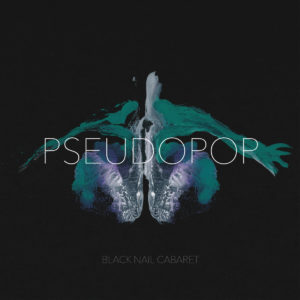
Black Nail Cabaret
Pseudopop
Dichronaut Records
Black Nail Cabaret has always been a project that lives and dies by the charisma of vocalist Emese Arvai-Illes. Her smokey voice is an astonishing instrument, providing continuity to the project through changes in style and line-up (notably the departure of founding member Sophie Tarr, who was replaced by producer and instrumentalist Krisztian Arvai). New album Pseudopop is far afield of the electro-pop of Black Nail Cabaret’s past, mostly trading in moody electronics of varying degrees of effectiveness.
In the record’s favour, Arvai-Illes is never far from the forefront of its ten songs, her powerful and sultry voice bringing gravitas and theatrical intensity to everything it touches. Songs like opener “Icarus” really highlight exactly what she can do: a skeletal arrangement of synths and drums that builds the barest of structures for her to ride upon, which she does with expertise and confidence born from control. “Techicolor” and “Verge on the Creepy” hit similar notes despite having a fuller sound. Rich string pads and echoing keys perfectly set up Emese to deliver performances rich with emotion, with her distinctive alto cutting through the mix like a knife. When the tempo does pick up, as on single “Bête Noire” she displays a nimbleness in enunciation, forcefully vamping the song’s slightly Tori Amos-referencing chorus (“I think I want to kill you/But I believe in peace, bitch”) with verve.
Sadly, the album too often fails at delivering notable material. In spite of Arvai-Illes’ best efforts, many of the tracks are too slight or give her too little to work with from a songwriting standpoint. Some, like “90s”, a musical homage to the titular decade’s chiller electronic sounds, have decent concepts but don’t coalesce into anything tangible. Others like “Trigger Happy” and “Rhythm X” pick interesting palettes from a sonic perspective but meander too much and lack tangible hooks. They’re not bad, just not memorable, easily sliding out of the mind of the listener moments after they end.
Appreciation for Pseudopop will ultimately come down to exactly how much appetite one has for Emese Arvai-Illes’ voice. She’s there to enliven its lesser moments, and elevate its better than average ones to quite nice, but without her it just wouldn’t have much at all to offer. As a delivery mechanism for her wonderful presence, it serves its purpose and can be enjoyed in that context.





